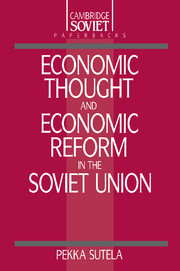4 - The years of radicalism and reaction
Published online by Cambridge University Press: 20 May 2010
Summary
The new economic journalism
The economic reform discussion of the sixties differed in several respects from that of the late eighties. While professional economists like Abalkin, Aganbegyan, Bogomolov, Bunich, Latsis, Petrakov, Popov, Shatalin and Zaslavskaya have been among the prominent spokesmen of perestroika, the reform discussion of the sixties was dominated by non-economists. ‘In fact, who are now most actively discussing economic problems?’, asked Nikolai Petrakov in 1970, ‘Journalists, writers, mathematicians, airplane constructors, automation specialists. The voices of the economists are only heard quite distantly in this choir.’ The Sofeists were a small minority, who mostly wrote for the specialised press. The impotence of political economists continued to be in evidence. Leonid Abalkin, one of the few reformist young political economists, commented on this in 1971. Political economy had unfortunately never become ‘a theory of rational economising’, Abalkin complained. It had not been able to answer the challenge of the reform. It had opinions about economic laws, but not about their practical importance. Many reform proposals, however well-meaning, only hung loosely together, Abalkin concluded.
This does not mean that the economists had been silent. There were veteran economists like Nemchinov, Novozhilov and Aleksandr Birman, a professor of finance, who advocated the cause of reform in numerous articles and booklets. In addition, for the first time since Stalin's assumption of power, economists and economic journalists took the reform discussion onto the pages of widely read literary journals like Novyi Mir, the most progressive journal of the time. It had published Solzhenitsyn, but it also opened its pages to economists and economic journalists like Grigori Khanin, Otto Latsis, Gennadi Lisichkin, Nikolai Petrakov, Vasili Selyunin and also Leonid Abalkin.
- Type
- Chapter
- Information
- Economic Thought and Economic Reform in the Soviet Union , pp. 74 - 94Publisher: Cambridge University PressPrint publication year: 1991



